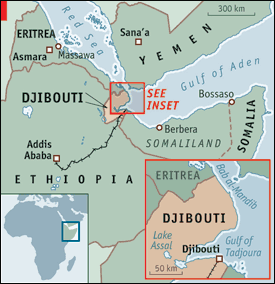
By Hussein Ali Nur and Guled Mohamed
HARGEISA, Somalia, June 27 (Reuters Life!) - On July 13, 1988, Somali fighter pilot Abdi Mohamed Hassan was ordered to bomb Hargeisa city as part of operations by dictator Mohamed Siad Barre to crush anti-government forces.
Hassan defied his superiors, and instead dropped his load on bare mountains close to the hilly city in north Somalia that is now capital of the breakaway region of Somaliland.
Then he crash-landed on a beach in neighbouring Djibouti after running out of fuel, handed himself in to local authorities, and eventually won asylum in Luxembourg despite Somalia's bid to bring extradite him.
Twenty years on, Hassan -- now a businessman in Luxembourg -- is back in Hargeisa for the first time, invited by the government as a guest of honour during this week's celebrations of Somaliland's independence from Britain on June 26, 1960.
"The instruction was to bomb Hargeisa city using Russian made Fab 500kg bombs," the 56 year-old father-of-four told Reuters in the city, where ruins still bear witness to the massive bombardment of 20 years ago.
"But I had already made up my mind never to drop the bombs. As a soldier, I swore to protect my people. There was no way I could hurt my own countrymen."
Now Hassan is thinking of moving back to his homeland -- either Hargeisa or Mogadishu, the capital of Somalia, where he was born.
In Hargeisa, a camouflaged metal replica of Mig fighters like the one Hassan flew stands in Independence Square as a memorial to the bloodshed and terror unleashed by Barre, who was toppled in 1991.
Somaliland, a former British protectorate, won independence in 1960 just four days before Italy relinquished the south. The two territories joined together to form modern Somalia.
Inter-clan hatred ensured the union was a difficult one, and those four days in 1960 now form the legal case for Somaliland's 1991 declaration of independence.
Although it lacks international recognition, the northern enclave has held democratic elections and is relatively peaceful compared to the rest of Somalia, especially in the south.
The bespectacled and bearded Hassan is disgusted by daily violence in Mogadishu and elsewhere in the south, where Islamist insurgents are battling the Somali government and its Ethiopian military allies.
"Innocent civilians die every day in the south. I wish to urge the combatants to spare our country and people. I long for the day when peace will prevail in my beloved country," he said.
In Somaliland, Hassan is lauded for his decision 20 years ago. Peace activists gave him a certificate of appreciation.
"I am glad I did not drop those bombs here...I got a hero's welcome. I miss home and will one day return to settle in Hargeisa or Mogadishu," he said, showing the certificate. (Writing by Guled Mohamed; Edit by Matthew Jones)
To read more about the 1988 Somalia Air Force Operations in Hargeisa click this link: http://www.somalilandtoday.net/modules.php?name=News&file=article&sid=641













